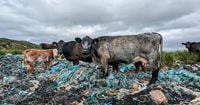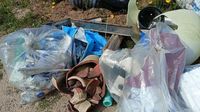Scotland's coastlines are becoming increasingly overwhelmed by marine litter, with a new documentary highlighting the pressing issue. The film, titled Shaping Our Shores, produced by Balanced Horizon, showcases the extensive efforts of volunteers to clean up beaches that are now almost unrecognizable due to the sheer volume of waste. In 2024 alone, Scotland saw a staggering 7% increase in litter, with volunteers collecting 527,468 items from its shores.
The Scottish Coastal Clean Up, which removed 36.5 tonnes of marine litter last year, primarily from remote beaches, is at the forefront of this initiative. Much of the debris collected is linked to the fishing industry, raising concerns about the environmental impact on marine life. Katie Ajie, operations coordinator for the Scottish Coastal Clean Up, expressed her shock at the extent of the problem. "When we turned up," she recalled, "there was a herd of cows munching away and the beach was just completely entangled and covered in rope."
Violet Fraser, a volunteer and coastal champion, described a similar experience on a beach in Skye, where the surface crunched underfoot due to accumulated plastic. "When we had removed around four tonnes, the level of the beach had dropped. That was really strange to see, almost like we didn't recognize it as the same place," she said.
In the Scottish Islands, the situation is even more dire. In 2024, volunteers collected 85,405 pieces of fishing and aquaculture gear, which made up 32% of all litter recorded in the area. This is significantly higher than the 12% recorded on the mainland. The Marine Conservation Society (MCS) has highlighted that the islands face a unique challenge due to the volume of litter, which has led to new methods of data collection.
At Arrochar, a notorious marine litter hotspot, the situation has reached alarming levels. Jacqui Willis, a beach and marine litter project worker for the GRAB Trust, noted that the overwhelming amount of litter makes it nearly impossible to conduct standard surveys. "With 38 volunteers in September 2024, we tackled 10m and removed and recorded only a small fraction of what was there," she explained. Last year, Arrochar saw an astonishing 55,300 litter items collected, which she believes "hugely under-represents the true figure."
The Scottish Government recognized Arrochar as a litter sink in 2017, investing £500,000 in a study to identify the sources of litter and to mechanically clear the area. However, as Willis pointed out, the waste continues to accumulate. "The Scottish Government declared Arrochar a litter sink in 2017 and spent £500,000 on a study which determined where the litter came from and mechanically cleared the head of the loch, sending hundreds of tonnes of deposited material to landfill," she said.
Wendy Murray, a long-time beach cleaning campaigner from East Haven Together, has witnessed the escalation of the marine litter problem over the decades. "We actually started in 1992, and we did think naively back then that if we did a beach clean once a year, that we would be able to keep the beach clean. That was, sadly, not the case," she reflected. In 2019, the charity even had to purchase an all-terrain vehicle to help lift heavy debris, as the amount of waste has increased significantly.
As the issue of marine litter continues to grow, volunteers like Fraser are calling for more support and funding for community action. "One of the main things needed is sustained funding for community action. We don't have funding for the communities to conduct these beach cleans and litter surveys," she said. They are also advocating for better waste management and recycling infrastructure to prevent further pollution.
Meanwhile, the problem of marine litter is not confined to Scotland. Across the globe, plastic waste is becoming an ever-growing concern. In 1970, the world produced around 10 million tonnes of plastic, a figure that skyrocketed to 400 million tonnes by 2021. Mike Berners-Lee, an author and climate campaigner, highlighted the alarming growth rate of plastic production. "We're doubling the amount of plastic in the world about every 15 years. It's a colossal growth rate," he said.
On the Italian side of the Mediterranean, the Municipality of Cabras has also initiated beach clean-up efforts. On March 30, 2025, volunteers collected 400 kilos of waste from Mare Morto beach, including plastic, glass, and even a tire. The event was part of the Sinis ecological days, with more clean-ups scheduled at Mari Ermi, Is Arutas, and Maimoni in the coming weeks.
Environment Councillor Carlo Carta emphasized the importance of environmental protection, stating, "The phenomenon of the presence of waste on the coast is physiological, because it is largely due to the movement of waste material due to sea currents, which pour numerous objects onto the beaches." However, he also acknowledged the role of human negligence in littering. "The low participation in these environmental cleanup days is a sign of a still too ephemeral sensitivity of citizens towards the environmental issue," he added.
As these initiatives continue, the hope is to inspire greater civic engagement and awareness of the environmental crisis. The upcoming clean-up at Is Arutas on May 3, 2025, will specifically involve local students, aiming to instill a sense of responsibility for the environment in the next generation. Mayor Andrea Abis remarked, "Environmental protection policies are increasingly necessary in a context that intends to communicate a territory with a strong eco-sustainable tourist vocation like Cabras."
Both Scotland and Italy exemplify the urgent need for collective action against marine litter. The efforts of volunteers and local organizations highlight the importance of community involvement in tackling this global issue. As the world grapples with the consequences of plastic pollution, it is evident that sustained commitment and innovative solutions are essential to protect our coastlines for future generations.





